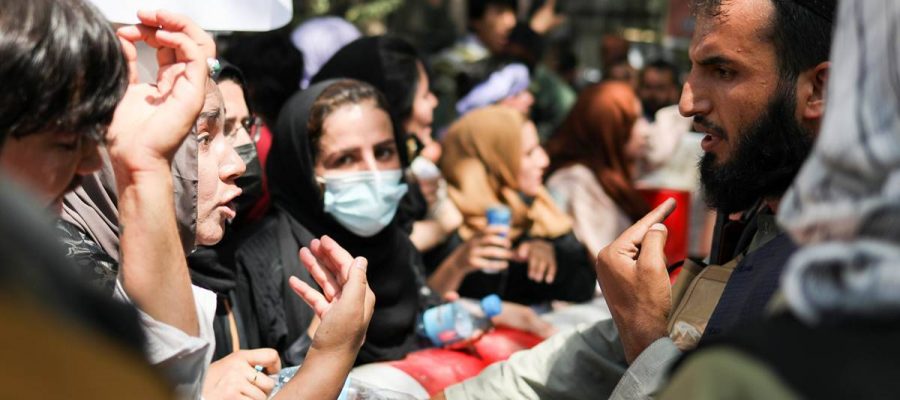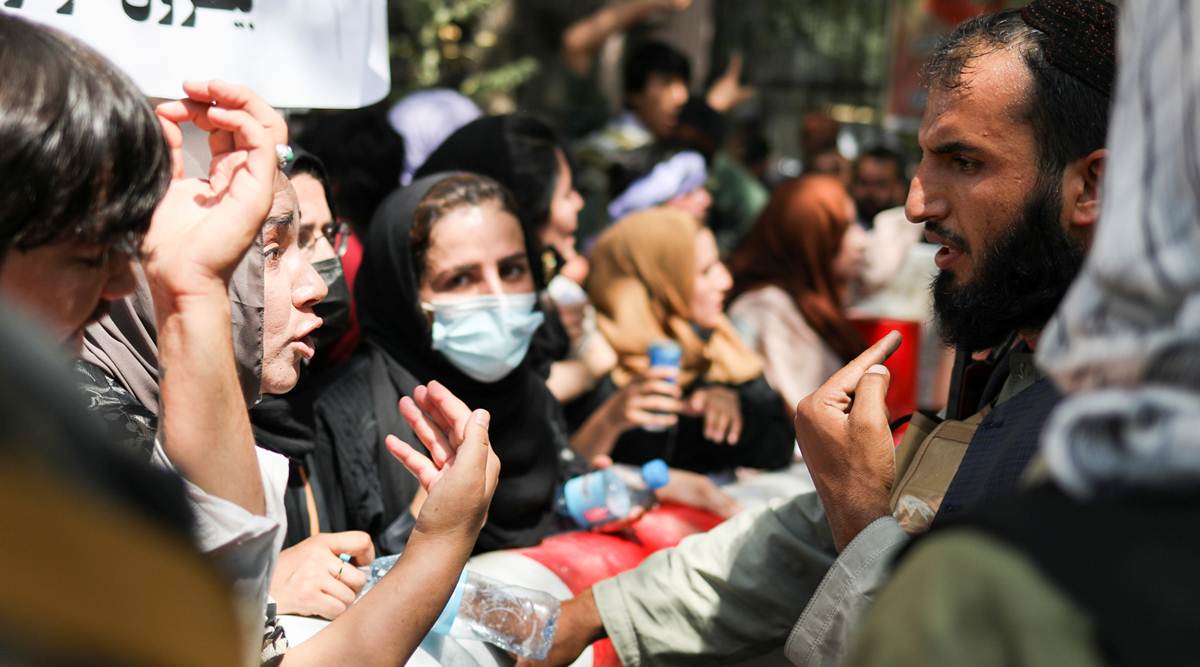As expected, no woman found a place in the cabinet, and there were very few non-Pashtuns — only three out of 33. This belied expectations in some quarters of the international community that they will be “inclusive” and “representative”.
Unveiling their interim government which had the Pakistani stamp all over, the Taliban Tuesday announced that Mullah Mohammad Hassan Akhund, the hardliner chief of the decision-making Rehbari Shura and the man who ordered the destruction of the Bamiyan Buddhas in 2001, will be the new Prime Minister of Afghanistan.
Mullah Hassan edged out Mullah Abdul Ghani Baradar, head of the Taliban political office in Qatar capital Doha, for the top post, ending the race and the war within for power-sharing, three days after Pakistan ISI chief Lt General Faiz Hameed reached Kabul to decide government formation.
Rawalpindi’s imprint was visible as leaders of the Haqqani Network terror outfit and the Kandahar-based Taliban group dominated the new cabinet while the Doha-based Taliban group, which had been negotiating with the international community and had established contacts with New Delhi, appeared to have been sidelined.
The assessment in Delhi was that at least 20 of the 33 in the new cabinet were from the Kandahar-based Taliban group and the Haqqani Network.
As expected, no woman found a place in the cabinet, and there were very few non-Pashtuns — only three out of 33. This belied expectations in some quarters of the international community that they will be “inclusive” and “representative”.
https://youtube.com/watch?v=BfFDsXIefaM%3Fversion%3D3%26%23038%3Brel%3D1%26%23038%3Bshowsearch%3D0%26%23038%3Bshowinfo%3D1%26%23038%3Biv_load_policy%3D1%26%23038%3Bfs%3D1%26%23038%3Bhl%3Den-US%26%23038%3Bautohide%3D2%26%23038%3Bwmode%3Dtransparent
From New Delhi’s perspective, Sirajuddin Haqqani as the Interior Minister is a key signal that Pakistan’s ISI has handpicked the cabinet.
Haqqani, head of the Haqqani Network and son of the warlord Jalaluddin Haqqani, is responsible for the terror attack on the Indian Embassy in Kabul in 2008 and attacks against Indians and Indian interests in 2009 and 2010.
Islamabad Imprint
The choice of the new PM and the induction of the Haqqanis in the interim Afghan government carries the imprint of Pakistan. The ISI chief reached Kabul three day ago to ensure its proxies get plum posts. For India, the Haqqanis getting government berths is bad news.
As Interior Minister, Haqqani’s mandate will include not just law and order, but also appointments of provincial governors. This will mean that he will have leverage and the ability to pack the country’s provinces with his – and ISI’s — handpicked men. The sense in South Block is that this will have deep strategic consequences for India, and the region.
A designated global terrorist, the US Department of State offered a reward of up to USD 5 million for information leading directly to the arrest of Sirajuddin Haqqani. He is also wanted for questioning in connection with the January 2008 attack on a hotel in Kabul that killed six people, including an American citizen. He is believed to have coordinated and participated in cross-border attacks against the US and coalition forces in Afghanistan. He was allegedly involved in the planning of the assassination attempt on Afghanistan President Hamid Karzai in 2008, the FBI said on its website.
Mullah Mohammad Hassan, the new Prime Minister, is on the UN terror list. He belongs to Kandahar, the birthplace of the Taliban, and was among its founders. He worked for 20 years as head of Rehbari Shura or leadership council and remained close to Mullah Haibatullah Akhundzada, the current supreme leader of the Taliban.
He had served as Foreign Minister and Deputy Prime Minister during the Taliban’s first government in Afghanistan from 1996 to 2001.
He was also Governor of Kandahar, Vice President of the Council of Ministers in 2001.
According to the UN, he is one of “30 original Taliban” and the George Washington University’s National Security Archive states: “Akhund holds prejudices against both westerners and the mujahadeen. Considered one of the most effective commanders. Studied at various madrassas in Pakistan.”
By 2001, he rose up the ranks to supervise the ministries of defence, intelligence, interior, supreme court, culture and communications, academy.
After Mullah Hassan, Mullah Baradar will be the first deputy PM (or head of government), and Abdul Salam Hanafi, an Uzbek, will be the second deputy PM.
https://youtube.com/watch?v=kxyt29Wc5Po%3Fversion%3D3%26%23038%3Brel%3D1%26%23038%3Bshowsearch%3D0%26%23038%3Bshowinfo%3D1%26%23038%3Biv_load_policy%3D1%26%23038%3Bfs%3D1%26%23038%3Bhl%3Den-US%26%23038%3Bautohide%3D2%26%23038%3Bwmode%3Dtransparent
Mullah Baradar, a co-founder of the Taliban in 1994, was captured in a February 2010 Pakistani intelligence operation in Karachi after he was found to have opened a channel of communication with Karzai.
He was released in 2018 at the behest of the US administration and became the face of the negotiations in Doha as head of the Taliban’s political office in Qatar since 2019.
He was also the first Taliban leader to directly communicate with a US President when he had a telephonic conversation with Donald Trump in March 2020. Having signed the Doha agreement on Taliban’s behalf, he was expected to become the next political leader of Afghanistan, but Pakistan’s ISI, which doesn’t completely trust him, scuttled his chances.
Mullah Yaqoob, son of Taliban founder Mullah Mohammad Omar, has been named Defence Minister.
He was a student of Mullah Haibatullah who had earlier appointed him as head of the powerful Taliban military commission.
Amir Khan Muttaqi, who has been named Foreign Minister, had served as Minister of Information and Culture during the first Taliban regime. Also on the UN terror list, he had served as a Taliban representative in the United Nations-led talks during the Taliban regime between 1996 and 2001. Muttaqi was one of the members of the Doha group led by Baradar.
Khalil Haqqani is the new Minister for Refugees. He is a specially designated global terrorist with close ties to Al Qaeda. He is Sirajuddin’s uncle and Jalaluddin’s brother. Khalil has aided and “acted on behalf of” the Al Qaeda’s military.
One of Haqqani’s trusted men is Mullah Taj Mir Jawad, Deputy Intelligence Chief. He led the Kabul attack network, which organised the various jihadi groups, including Al Qaeda, in an around Kabul.
Mullah Omar’s brother and Mullah Yaqoob’s uncle Mullah Abdul Manan Omari is the acting Minister of Public Works.
In effect, the top members of the new cabinet are mostly from the old Taliban regime which ruled the country from 1996 to 2001. They are considered extremely close to the ISI.
https://youtube.com/watch?v=UbtfJHis3iE%3Fversion%3D3%26%23038%3Brel%3D1%26%23038%3Bshowsearch%3D0%26%23038%3Bshowinfo%3D1%26%23038%3Biv_load_policy%3D1%26%23038%3Bfs%3D1%26%23038%3Bhl%3Den-US%26%23038%3Bautohide%3D2%26%23038%3Bwmode%3Dtransparent
Sher Mohammed Abbas Stanekzai, who had engaged with many international interlocutors in Doha as the deputy head of the Taliban office, has been sidelined as Deputy Foreign Minister – a post he had held in 1996 as well before being moved as Deputy Health Minister.
Stanekzai met Deepak Mittal, India’s ambassador to Qatar, on August 31 — the first official contact made public.
Of the 33 cabinet members, only three are said to be non-Pashtuns and from ethnic minorities — Second Deputy Head of Government Abdul Salam Hanafi is an Uzbek; Chief of Army Staff Qari Fasihuddin and Minister of Economy Qari Deen Hanif are Tajiks.
Fasihuddin was key to Taliban’s advance in Badakhshan in north-east Afghanistan, and naming him Army chief is said to be a reward.
Among the cabinet ministers are also some former Guantanamo Bay prisoners including Khairullah Khairkhwa (Minister of Information and Culture) and Abdul Haq Waseeq (intelligence chief). Mullah Noorullah Noori, Minister of Borders and Tribal Affairs, is another former Guantanamo Bay inmate.
The new government in Kabul is based on the lines of the Iranian leadership, with the group’s top religious leader Mullah Haibatullah Akhundzada as Afghanistan’s supreme authority.
According to a statement released after the cabinet appointments, Akhundzada told the new government to uphold Islamic rules and Sharia law in Afghanistan.
In a statement released in English, he also urged those in charge to protect the country’s highest interests and ensure “lasting peace, prosperity and development”.
Source: Read Full Article


